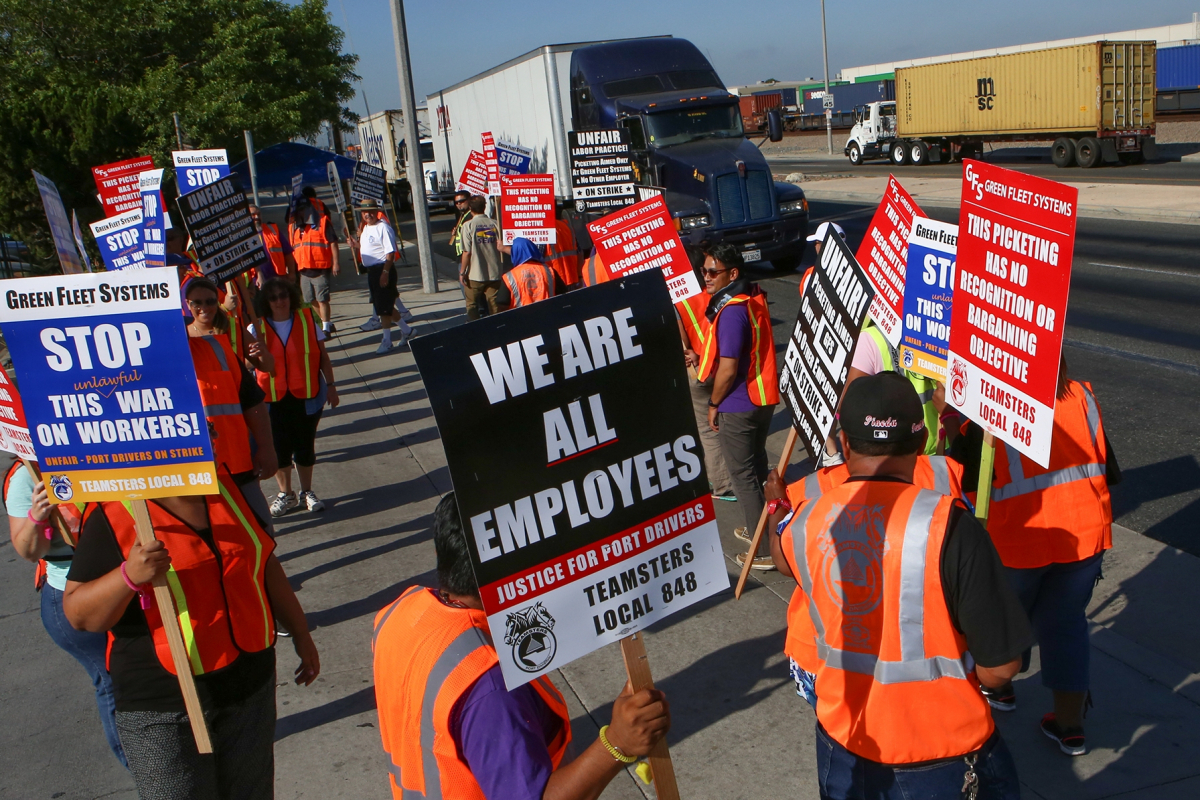Omitted a Key Point
In this article you omitted a key point: These port truckers, who work for some of the same maritime companies as ILWU longshoremen, are trying to organize a union with the help of the Teamsters, were able to shut down terminals only because longshore workers whose coastwide contract had expired July 1 honored their picket lines. As is usual in longshore negotiations, the contract was not extended, enabling longshoremen (who load and unload ships) to give their bargaining team more leverage by taking job actions. That's why the port truckers chose to picket Monday, to have maximum impact by appealing to longshoremen to honor their picket and shut down the three terminals.
However, in "a strange turn of events" as the Journal of Commerce, the maritime employers' newspaper, reported on the same day your article appeared the "arbitrator was called in and, to no one’s surprise, ruled that the truckers’ action did not constitute a “bona fide” picket under the waterfront contract. He ordered the longshoremen back to work, and they promptly returned to their jobs."
The arbitrator was called by Pacific Maritime Association (PMA), the employers' group, because the ILWU International officers – after earlier refusing to extend the contract, thus allowing union members to respect any picket line, or to strike – suddenly, just as the truckers picketing began to pick up a head of steam agreed to extend the contract for three days, long enough to kill the port truckers' picket. The result: longshore workers stopped work for two hours on Tuesday while the arbitrator made his pre-determined decision. Then, under the direction of their union officials, longshoremen returned to work, despite the fact that the ILWU has a long and proud tradition of not crossing picket lines. Clearly, this was a deal worked out in cahoots with PMA head, McKenna, and ILWU International officers at the negotiating table "to keep the cargo moving" at the expense of labor solidarity.
This principle of honoring picket lines is one of ILWU's 10 Guiding Principles and not infrequently has meant defying arbitrators' orders to cross picket lines. That principle has been seriously eroded in recent years, particularly in regard to port truckers in major West Coast ports. Longshoremen crossing port truckers' picket lines have taken the wind out of the sail of their union organizing efforts several times. Now that the ILWU has quit the AFL-CIO, it is especially important for the ILWU to garner as much support as possible of port workers, union and nonunion, during these seminal contract negotiations.
By honoring port truckers' picket lines ILWU will gain important allies and perhaps new union members in the fight against maritime employers. Better yet, by striking together, longshore workers and port truckers could shut down every West Coast port tight and call on East and Gulf Coast ports like Charleston who are in contract negotiations to join together for what could be a powerful display of workers solidarity. That kind of class struggle is what built the unions in the first place and is sorely needed now.
In addition to the Teamsters, truckers groups in several ports are seeking to organize the terribly overworked and underpaid port truckers, as well as to overturn laws and rulings mis-classifying them as “independent contractors.” Port truckers, many of whom are immigrant workers, should have the right to join the union of their choice, and by supporting their fight, longshore workers can strike a powerful blow to defend their own jobs, working conditions and benefits. But it all begins by respecting picket lines, the basic trade union line in the class struggle.
[Jack Heyman is chair of the Transport Workers Solidarity whose members have helped initiate and organize ILWU's 1984 protest strike against a ship from apartheid South Africa, the 2008 May Day West Coast Ports Strike against the imperialist wars in Iraq and Afghanistan and the 2011 Bay Area ports shutdown in solidarity with the Wisconsin public workers' occupation of the state capitol.]








